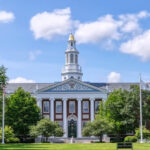Free Will & Academia
Scholars weigh in on the subject of free will in a recent Chronicle Review colloquy. They’re agin’ it, for the most part:
- “Your brain and body, the vehicles that make ‘choices,’ are composed of molecules, and the arrangement of those molecules is entirely determined by your genes and your environment,” Jerry A. Coyne argues. “Your decisions result from molecular-based electrical impulses and chemical substances transmitted from one brain cell to another. These molecules must obey the laws of physics, so the outputs of our brain—our ‘choices’—are dictated by those laws.” Coyne is a professor in the department of ecology and evolution at the University of Chicago.
- “My money is on a slight unconscious bias toward a particular button—a bias that may give the participant about a 60-percent chance of pressing that button next,” Alfred R. Mele argues. “Given such flimsy evidence, I do not recommend betting the farm on the nonexistence of free will.” Mele is a philosophy professor at Florida State.
- “Alas, just as we have learned that the world is not flat, neuroscience, with its ever-increasing mechanistic understanding of how the brain enables mind, suggests that there is no one thing in us pulling the levers and in charge,” Michael S. Gazzanigaof the University of California at Santa Barbara states. “It’s time to get over the idea of free will and move on.” Nevertheless, he insists on the need for personal responsibility: “Responsibility exists at a different level of organization: the social level, not in our determined brains.”
- “Want to understand free will?” Johns Hopkins University philosophy professor Hilary Bok asks. “Don’t look to neuroscience.” “As a philosopher, I often find speculation about the implications of neuroscience for free will perplexing,” Bok explains. “While some neuroscientists describe free will in ways that I recognize, others, including some distinguished and thoughtful scientists, do not.”
- Owen D. Jones, a professor of law and biological sciences at Vanderbilt calls for “The End of (Discussing) Free Will.” “Will is as free as lunch,” he asserts. “If you doubt, just try willing yourself out of love, lust, anger, or jealousy.” Actually, churchgoers have been doing this for centuries.
- “Free Will does not exist,” Yale psychologist Paul Bloom claims. “So what?” “He is the reason I am transfering to Havard,” one of Bloom’s reviewers wrote on Rate My Professors.com. Apparently that student hadn’t heard that free will does not exist.
Malcolm A. Kline is the Executive Director of Accuracy in Academia.
If you would like to comment on this article, e-mail contact@academia.org.




